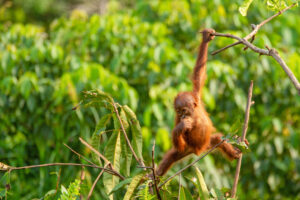Conventional wisdom says humans are “the fat primate.”
A new study disagrees.
A survey that measured the body fat and dietary tendencies of a wide range of non-human primates both in captivity and in the wild concluded “humans are not unique in the propensity to overweight and obesity.”
The study compared the captive primates to Americans eating western diets — and the wild ones to subsistence hunter-gatherers.
Wait a minute. I thought that humans developed soft, fatty tissues and perspiring skin in response to food scarcity and survival under conditions of prolonged heat exposure. That our propensity to add body fat, up to 36% in females and 20% in males on average, helped us not only survive but reproduce during lean times.

Photo: Steve Baker via Flickr
I thought that bonobos, our closest primate relatives, had only become obese in a few isolated cases of captivity.
Herman Pontzer, a biological anthropologist at Duke University and author of the new study, wipes the slate clean.
“Lots of primates put on too much weight, the same as humans,” he told Science. “Humans are not special.”
So why not?
The broad assumption is that we acquired our survivalistic obesity after we climbed down from the trees and became bipedal. The advent of agriculture later introduced famine, which existentially demanded fat storage.
Up until recently, obese non-human primates had been rare, but what did that mean? Put an ape on the same generous diet and languid behavior as the average human couch potato, and the same thing sometimes resulted.
Kanzi, a bonobo with a reputation for understanding human languages, became massively overweight after years of food reward-based training. (He underwent a diet and ultimately shed 35 kilograms — roughly the weight of one small adult bonobo.)
Images of one captive macaque in Thailand induce cringing in familiarity. Handlers dressed up him in a tank top and kept him harnessed to a sort of couch. He eventually weighed 20kg, or three times as much as an average macaque.
Pontzer’s approach was methodical, rather than anecdotal. The researcher sourced weight stats for 3,500 non-human primates (representing 40 species) living at zoos, research facilities, and in the wild.
Not surprisingly, he found many captive individuals were overweight.
So he began pulling weight statistics for humans — about 4,400 U.S. adults eating a typical Western diet, and some adults from nine subsistence populations who still hunt, gather, and grow their own food, according to Science.
Results after controlling for height showed that the Westerners were about 50% heavier on average than their subsistence counterparts. That was “the same ratio as seen in captive primates,” Science reported.
Verdict? Don’t eat junk food, no matter what species you are.






